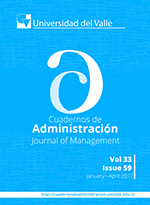Towards dialogic administration: a proposal from Gadamer’s thinking
Main Article Content
Traditional administration, the normative-cut and exacerbated-control one, is still in force in theoretical-type proposals as much as it is in business practices, which is due to the resistance to give up instrumental rationality within organizational management. This phenomenon has permeated all the dimensions experienced in an organization; even the most human acts, such as dialogue and communication, have been prey to instrumentation. The purpose of this paper is to set forth the need for dialogic administration capable of overcoming the fundamental pillars of traditional instrumental management. To accomplish this task, a qualitative-documentary type of methodology and a hermeneutic method were used by studying, firstly, the theoretical foundations of traditional administration and, secondly, by interpreting the constituent elements of the “dialogue” category in Gadamer’s thinking so as to create a discussion about how Gadamerian postulates may serve as the basis to build a dialogic administration proposal, where dialogue is rescued from instrumentation, and given its place as the most humane in men within an organization and then become an integral part of the organizational culture, because it provides recognition to each person’s uniqueness and promotes learning processes.
Downloads

This work is licensed under a Creative Commons Attribution-NonCommercial-NoDerivatives 4.0 International License.

